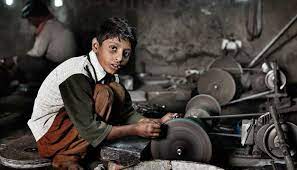Najibullah Khan
Child labor does not only impact educational, intellectual, psychological and emotional developments of a child but it deprives a child from opportunities and creativities and put an everlasting burden on them. It is a social error which has been the product of various factors like poverty, antiquated social customs, unemployment, lack of education and various other social factors.
In Pakistan specially in the Provincial capital Peshawar many prefer to employ children because they are easier to manage than adult less skilled, they are less aware of their rights, they can be controlled and more easily threatened, consume fewer resources more active and require less space. People who hire child domestic help look upon themselves as the saviours of these hapless children.
A 12 year-old Amina from tribal area forced to work by her parents as caretaker of the children of a rich family in Peshawar. She said we are 3 sisters and 1 brother, all my sisters work in homes in Peshawar. The people where my sisters and I work give my father wages every month. I don’t remember when I met my sisters because we hardly get a holiday.
11 years old Saima from rural areas of Peshawar is selling flowers in Peshawar, says that I want to go to school, but I can’t afford it, because we are very poor, my father is selling Potato chips, he has no money for my school. After selling flowers, I give money to my father, which is used for the kitchen expenses of our family.
Another boy, Roohullah was working in a workshop in Peshawar, lying under a car, hoping to earn some money to support his family by the evening. Roohullah said that my annual exams are going on and today I came to the workshop with an Social study paper. Tomorrow is my Urdu paper but it is not possible for me to give time to study during the day. He added that my father is addicted to heroin, while there are two younger sisters in the house, and mother is suffering from tuberculosis diseases (TB). He said that in the morning he goes to school and in the afternoon comes to work here in the workshop, from where he gets two hundred to three hundred rupees a day for his family’s livelihood.
For poor families, sending children off to work is considered to be the best use of their time as they earn money for the whole family. Instead of educating these parents, privileged families hire their children, exploiting their situation, while the government ignoring this practice.
Our governments consistently failing to have shown little interest in raising the living standard of our extremely poor classes. It is the government’s responsibility to provide food, shelter and other essentials of life so that parents can send their children to school instead of work. Every child has the right to live with dignity and in such a way that childhood becomes a period of growth, learning and development.







